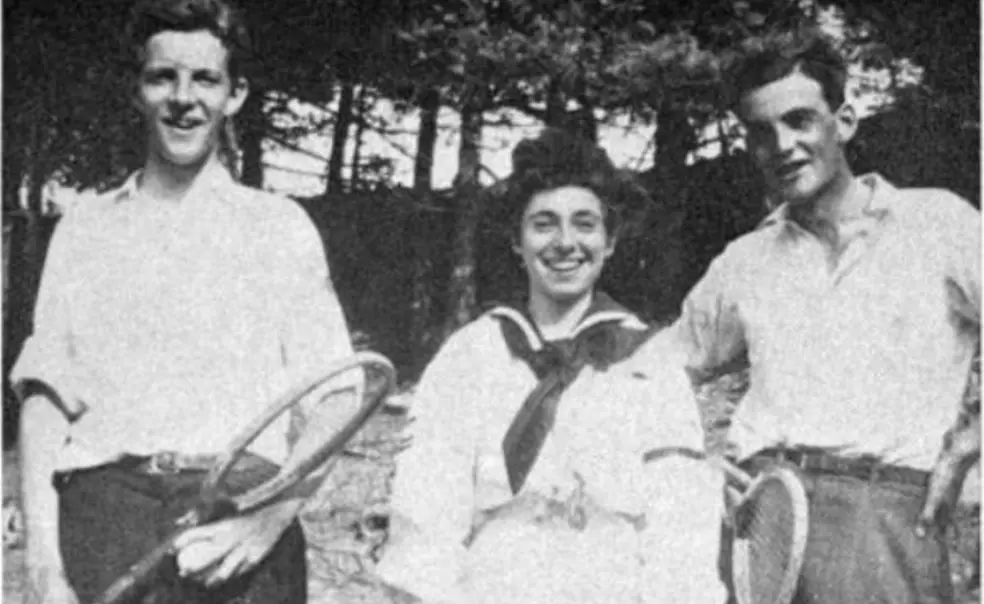John Foster Dulles ’08 As an Undergraduate
This thoughtful piece of journalistic enterprise is reprinted from the Dulles Memorial issue of the Daily Princetonian. The snapshot above was taken at the Foster estate at Henderson Harbor on Lake Ontario by Miss “Beth” Hibben (later Mrs. Robert Scoon), daughter of the future Princeton President and a Bryn Mawr friend of Miss Margaret Dulles, and is reproduced with her kind permission. – Editor (1959)
Friends and classmates remember the undergraduate, John Foster Dulles ’08, as a quiet and unassuming figure on campus.
A brilliant student – he was Valedictorian and graduated Phi Beta Kappa – Dulles “never had to study too much,” according to former Congressman Ralph A. Gamble ’09. “He could read a book over once and grasp it fully.”
The former Secretary of State was, however, a very conscientious student. Robert C. Clothier ’08, President Emeritus of Rutgers University and once editor of the Daily Princetonian, relates that Dulles “came to Princeton for an education and got one. I’m not sure the rest of us were so serious.”
Clothier reflects that Dulles was not the “mixer” type as was his brother, Allen W. Dulles ’14. Coming out of Watertown (N.Y.) High School, Dulles never joined a club and apparently admired the stand taken on the clubs by Princeton’s President T. Woodrow Wilson ’79. Dulles was later to be made an honorary member of Cottage Club.
Dulles limited his extracurricular participation to the Whig Society and the Philadelphian Society (predecessor of the SCA). He was the recipient of the junior debate prize.
Looking back on his undergraduate days, Dulles told the Prince in 1953 (in the first interview given any newspaper after he took office as Secretary of State) that “the major benefit I got from Princeton was participating in Woodrow Wilson’s courses where I gained my interest in publica affairs. “Through the classics I gained the knowledge and philosophy of the fundamental themes of thought that have constantly reappeared in history. I often read The Federalist Papers for their political wisdom.
“I was interested in the knowledge the authors of The Federalist Papers showed in Greece and Rome and how much Hamilton, Jay, and Madison had benefited from a knowledge of the classics as the young men who founded this nation. Their knowledge of Greek and Latin was very important to them and the kind of education I got was along the same line,” Dulles said.
Actually, his family had had a profound influence in pushing him along the political path before he came to Princeton. Mrs. Robert Scoon, the daughter of former President John G. Hibbon ’82 of Princeton, knew Dulles in his college years and attributes the success of his career to “a combination of tremendous ambition, family inspiration and encouragement, and Presbyterianism.”
On his mother’s side, Dulles’ grandfather was General John Watson Foster, Civil War veteran and Secretary of State under President Benjamin Harrison (1892-3). An uncle, Robert Lansing, served as Secretary of State in Wilson’s cabinet (1915-20).
Foster, whose grandson was almost single-handedly to conclude the Japanese Peace Treaty officially ending the Second World War in 1951, negotiated the Treaty of Shimonoseki, ending the Sino-Japanese War in 1895. Dulles’ preoccupation with 52 years of U.S. international affairs began in his junior year at Princeton, when he served as secretary to Foster at the Hague Peace Conference.
On the other side of the family, both Dulles’ father, the Rev. Allen M. Dulles, and his grandfather were Presbyterian ministers. His father was a professor at the Auburn Theological Seminary and Dulles himself, of course, was one of the great Presbyterian laymen in the country.
Dulles only occasionally got back to Princeton after his graduation. His most recent visit was a year ago this June, when he returned for his 50th Reunion. His stay, however, was abbreviated because of the crisis in Lebanon at the time, which compelled the elder statesman to return at once to Washington.
Dulles was given an LL.D. degree from Princeton in 1946, one of the more than a dozen degrees he received during his lifetime.
Dulles also returned to Princeton for the 1953 Alumni Day, for a major policy speech.
This was originally published in the June 5, 1959 issue of PAW.










No responses yet